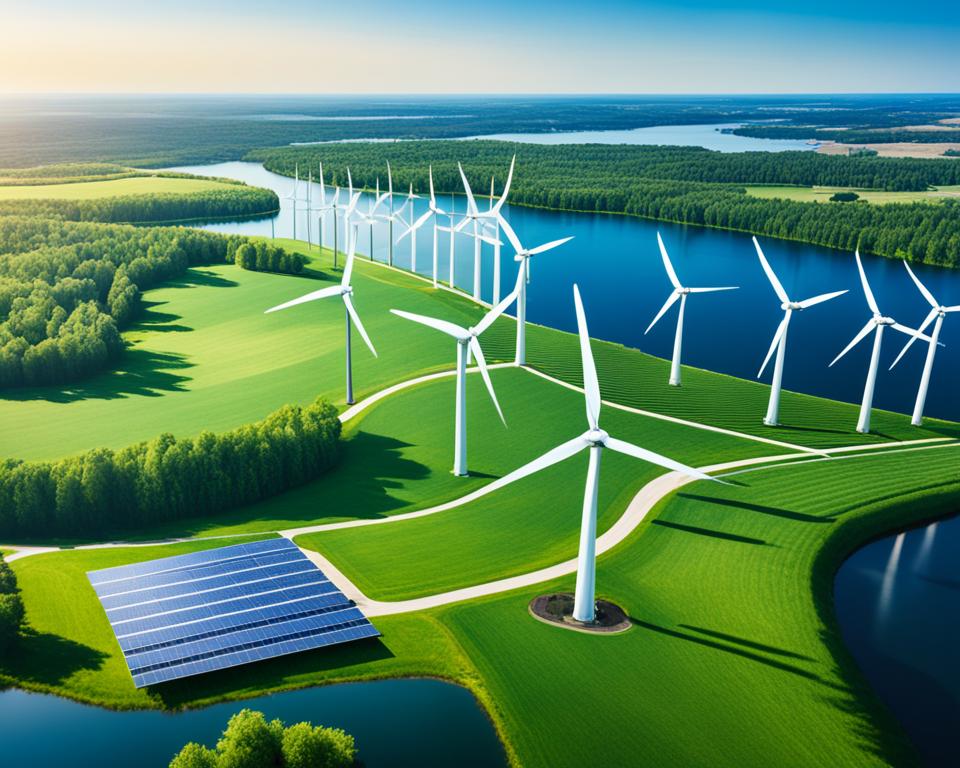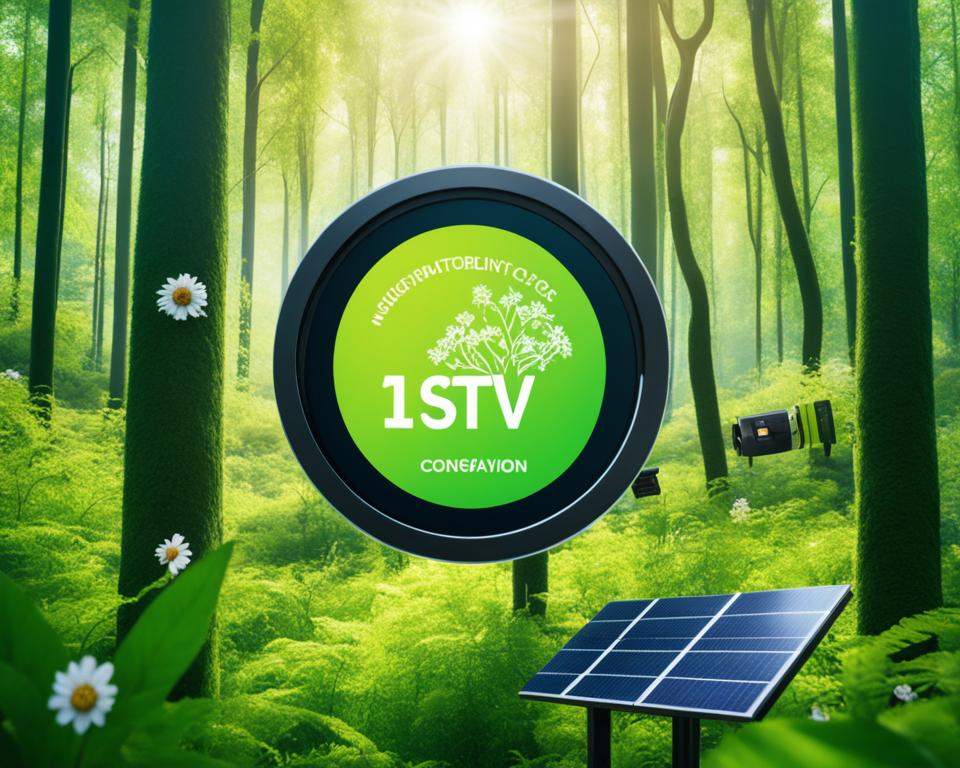Did you know that IPTV, or Internet Protocol Television, is leading the charge towards more sustainable and eco-friendly entertainment consumption? IPTV providers are adopting energy-efficient streaming technologies, optimizing data compression algorithms, and using adaptive streaming protocols to minimize bandwidth usage and reduce energy consumption. This innovative approach to streaming not only ensures a sustainable viewing experience but also significantly lowers the carbon footprint compared to traditional TV broadcasting.
Key Takeaways:
- Sustainable streaming practices in IPTV infrastructure are shaping a greener future for media consumption.
- IPTV providers adopt energy-efficient technologies and minimize carbon emissions through eco-friendly practices.
- Viewers can play their part by choosing energy-efficient devices and supporting sustainable IPTV providers.
- Optimizing streaming settings and minimizing bandwidth usage contribute to reducing energy consumption.
- The UK IPTV industry can reduce its environmental footprint through energy efficiency improvements and proper device recycling.
The Energy-efficient Advantage of IPTV
IPTV (Internet Protocol Television) utilizes energy-efficient streaming technologies, data compression algorithms, and adaptive streaming protocols to optimize bandwidth usage and reduce energy consumption. Unlike traditional TV broadcasting, which requires broadcasting towers and physical infrastructure, IPTV relies on internet-based transmission, making it inherently more energy-efficient. This innovative approach to content delivery not only enhances the viewing experience but also contributes to environmental sustainability.
Energy-efficient streaming technologies enable IPTV services to deliver high-quality content while minimizing the amount of data transmitted. These technologies, combined with advanced data compression algorithms, ensure that the streaming process requires less bandwidth compared to traditional broadcasting methods. By reducing the amount of data transmitted, IPTV helps conserve network resources and minimizes energy consumption.
Moreover, IPTV employs adaptive streaming protocols that dynamically adjust the quality of the video stream according to the viewer’s network conditions. This optimizes bandwidth usage by delivering the highest video quality possible while ensuring that the stream remains smooth and uninterrupted. By adapting to the available network capacity, adaptive streaming protocols prevent excessive data usage and reduce energy consumption.
An additional advantage of IPTV is its reliance on renewable energy sources for its internet infrastructure. Many IPTV providers prioritize sustainability and choose to power their data centers with renewable energy, such as solar or wind power. By leveraging renewable energy sources, IPTV significantly reduces its carbon footprint and helps mitigate the negative environmental impact associated with traditional TV broadcasting.
Energy-efficient Streaming Technologies
The use of energy-efficient streaming technologies plays a crucial role in reducing the energy consumption of IPTV. These technologies optimize video encoding and delivery, enabling high-quality streaming while minimizing bandwidth requirements. By compressing video data efficiently, IPTV services can deliver content with reduced file sizes, resulting in lower bandwidth usage and energy consumption.
| Streaming Technology | Benefits |
|---|---|
| H.265 (HEVC) | Advanced video compression format that reduces bandwidth consumption by up to 50% compared to older codecs. |
| AV1 | Innovative open-source video codec that provides excellent video quality at lower bitrates, contributing to energy efficiency. |
| Dynamic Adaptive Streaming over HTTP (DASH) | Streaming protocol that dynamically adjusts video quality based on network conditions, optimizing bandwidth usage and improving energy efficiency. |
These energy-efficient streaming technologies are continuously evolving, driven by the industry’s commitment to sustainability and eco-friendly practices. As a result, IPTV viewers can enjoy their favorite content while minimizing their environmental impact.
By leveraging the energy-efficient streaming technologies and adopting sustainable practices, IPTV contributes to reducing carbon emissions and minimizing the strain on energy resources. The combination of energy-efficient streaming technologies, data compression algorithms, adaptive streaming protocols, and reliance on renewable energy sources places IPTV at the forefront of eco-friendly practices in the entertainment industry.
Eco-friendly Practices in IPTV Infrastructure
IPTV providers are committed to minimizing their environmental impact by adopting eco-friendly practices. One of the key steps they take is investing in energy-efficient data centers. By optimizing electricity consumption, these data centers reduce carbon emissions and contribute to a greener future.
Additionally, IPTV companies recognize the importance of offsetting carbon emissions. They actively engage in reforestation projects, which help counterbalance their environmental footprint. Through these initiatives, IPTV providers contribute to environmental preservation and sustainability.
Furthermore, IPTV providers prioritize the implementation of sustainable business practices. By minimizing energy consumption and carbon emissions, they set an example for other industries to follow. These practices not only benefit the environment but also foster a culture of sustainability in the business world.
Benefits of Eco-friendly Practices in IPTV Infrastructure
- Reduced carbon emissions
- Minimized environmental footprint
- Promotion of sustainability
- Inspiration for other industries
- Contribution to a greener future
Energy-efficient Data Centers: Key to Eco-friendly IPTV
Data centers play a crucial role in the IPTV infrastructure. By adopting energy-efficient data centers, IPTV providers significantly reduce their electricity consumption and carbon emissions. These centers leverage state-of-the-art technologies and practices to optimize energy usage, resulting in a more sustainable IPTV ecosystem.
Here are some key features and benefits of energy-efficient data centers:
| Features | Benefits |
|---|---|
| Advanced cooling systems | Minimized energy consumption |
| Virtualization technologies | Optimized resource utilization |
| Power management solutions | Reduced electricity wastage |
| Renewable energy integration | Lower carbon footprint |

The image above visually represents the eco-friendly practices in IPTV infrastructure, highlighting the importance of energy-efficient data centers in reducing carbon emissions.
Tips for Minimizing Environmental Impact of IPTV Viewing
Viewers can adopt various practices to minimize their environmental impact while enjoying IPTV. By making conscious choices regarding their devices, streaming settings, and IPTV providers, individuals can contribute to a more sustainable viewing experience. Here are some tips to help you reduce your environmental footprint:
1. Choose Energy-Efficient Devices
Opt for ENERGY STAR certified smart TVs and streaming sticks when selecting IPTV viewing devices. These energy-efficient devices are designed to consume less power without compromising on performance. By choosing such devices, you can significantly reduce your energy consumption and contribute to a greener environment.
2. Optimize Streaming Settings
Make use of streaming settings optimization to minimize bandwidth usage and conserve energy. Adjusting the video resolution to a lower setting can significantly reduce data consumption. By selecting a resolution that is suitable for your viewing needs, you not only save bandwidth but also reduce the energy required for video processing and transmission. Additionally, consider using Wi-Fi instead of cellular data for streaming, as Wi-Fi typically consumes less energy.
3. Support Sustainable IPTV Providers
Choose IPTV providers that prioritize sustainability and environmental stewardship in their operations. These providers often implement eco-friendly practices such as investing in energy-efficient data centers and actively reducing their carbon emissions. By supporting such sustainable IPTV providers, you contribute to driving the industry towards more environmentally conscious practices.
| Energy-efficient Devices | Streaming Settings Optimization | Sustainable IPTV Providers |
|---|---|---|
|
|
|
Environmental Impact of IPTV in the UK
IPTV usage in the UK poses significant environmental challenges, particularly in terms of energy consumption and carbon emissions. These challenges primarily stem from the operation of data centers responsible for hosting and delivering streaming content.
Data centers require a substantial amount of electricity to power their servers, cooling systems, and infrastructure. As a result, the energy consumption of these data centers contributes to increased carbon emissions, adding to the carbon footprint associated with IPTV usage.
Furthermore, the streaming content itself also consumes energy, further exacerbating the environmental impact. The process of transmitting and delivering video content to viewers consumes significant amounts of energy, leading to additional carbon emissions.
Lastly, the production and disposal of IPTV devices also contribute to the overall environmental burden. The manufacturing process of these devices requires the extraction and processing of raw materials, which can have a negative impact on the environment. Additionally, improper disposal and e-waste management can lead to further environmental degradation.

Strategies to Reduce Environmental Footprint of IPTV in the UK
To mitigate the environmental impact of IPTV in the UK, several strategies can be implemented. By adopting these measures, IPTV providers can significantly contribute to reducing their carbon footprint and promoting sustainability in the industry.
Energy Efficiency Improvements
To minimize electricity consumption and carbon emissions, IPTV providers can invest in energy-efficient technologies and infrastructure for their data centers. By optimizing cooling systems and implementing power management solutions, they can reduce energy usage and create a more sustainable streaming environment.
Sustainable Streaming Practices
Educating users about the impact of streaming and encouraging sustainable viewing practices can help reduce bandwidth usage and energy consumption. Promoting standard definition viewing, optimizing streaming settings, and enabling options for lower-resolution streaming can contribute to minimizing the environmental footprint of IPTV.
Renewable Energy Investment
By committing to sourcing electricity from renewable energy sources, such as wind or solar power, IPTV providers can ensure that their operations are powered by clean and renewable energy. This investment in renewable energy contributes to a greener and more sustainable future.
Device Recycling and E-Waste Management
IPTV providers can implement programs for device recycling and proper e-waste management to reduce electronic waste and its negative environmental impact. By promoting responsible disposal and recycling practices, the industry can minimize e-waste accumulation and contribute to a circular economy.
| Strategies | Benefits |
|---|---|
| Energy Efficiency Improvements | – Reduces electricity consumption – Lowers carbon emissions |
| Sustainable Streaming Practices | – Decreases bandwidth usage – Minimizes energy consumption |
| Renewable Energy Investment | – Supports clean and sustainable power sources – Reduces reliance on fossil fuels |
| Device Recycling and E-Waste Management | – Reduces electronic waste accumulation – Promotes a circular economy |
By implementing these strategies, the UK IPTV industry can significantly reduce its environmental footprint and contribute to a more sustainable media consumption landscape. Embracing energy efficiency improvements, sustainable streaming practices, renewable energy investment, and responsible e-waste management, IPTV providers can pave the way for a greener future.
IPTV’s Contribution to Sustainable Living and Eco-Friendliness
IPTV plays a pivotal role in promoting sustainable living and eco-friendliness by providing a platform for dedicated channels that spread awareness and encourage eco-friendly practices. Through its global reach and wide audience, IPTV enables the dissemination of information about sustainable living practices to a diverse set of viewers.
The educational content delivery capabilities of IPTV enhance the effectiveness of sharing knowledge and promoting eco-friendly behaviors. With high-quality video streaming, viewers can engage with educational content that highlights the importance of sustainable practices, empowering them to make informed choices.
IPTV also enables live coverage of environmental events, allowing viewers to experience and understand the impact of various environmental issues firsthand. By broadcasting documentaries and providing a platform for eco-tourism, IPTV showcases the beauty of our planet and the urgent need to protect it.
Furthermore, IPTV serves as a platform for green innovation showcases, promoting eco-friendly products, services, and initiatives. By highlighting environmentally sustainable practices, IPTV encourages viewers to adopt more sustainable choices in their daily lives.
Overall, IPTV’s contributions to sustainable living and eco-friendliness extend beyond entertainment. With its global reach and educational content delivery capabilities, IPTV has the potential to create a positive impact on the environment by raising awareness, inspiring action, and promoting a greener future.
Benefits of IPTV for Sustainable Living
- Global reach and awareness: IPTV enables the widespread distribution of information about sustainable living practices, reaching audiences across different countries and cultures.
- Educational content delivery: IPTV enhances the delivery of educational content, making it more engaging and accessible to viewers, thereby promoting sustainable behaviors.
- Live coverage of environmental events: IPTV allows viewers to experience and understand the impact of environmental events in real-time, fostering greater empathy and concern for the environment.
- Documentaries and eco-tourism: IPTV broadcasts documentaries and showcases eco-tourism, raising awareness about environmental issues and promoting sustainable travel and exploration.
- Green innovation showcases: IPTV provides a platform for highlighting green innovations, encouraging viewers to adopt eco-friendly products and services.

With its vast array of channels and content, IPTV has the potential to shape attitudes and behaviors towards sustainability, driving a collective effort to preserve our planet for future generations.
Conclusion
Sustainable streaming practices in IPTV infrastructure are paving the way for a greener future in media consumption. With the adoption of energy-efficient technologies, IPTV minimizes carbon emissions and implements eco-friendly practices. Viewers also have a role to play by choosing energy-efficient devices, optimizing streaming settings, and supporting sustainable IPTV providers. By taking these steps, we can collectively reduce our environmental impact.
The UK IPTV industry has the potential to significantly decrease its environmental footprint through energy efficiency improvements, sustainable streaming practices, investment in renewable energy, and proper device recycling. By embracing these initiatives, the industry can contribute to a more sustainable and eco-friendly future.
IPTV emerges as a powerful tool for spreading awareness and promoting eco-friendly practices in sustainable living. Through its global reach, IPTV provides a platform for channels dedicated to educating viewers about sustainable living practices, delivering high-quality video content, and showcasing green innovations. By harnessing the power of IPTV, we can actively participate in creating a more sustainable world.
FAQ
What makes IPTV a sustainable streaming option?
How do IPTV providers implement eco-friendly practices?
What can viewers do to minimize their environmental impact while enjoying IPTV?
Does IPTV usage in the UK pose environmental challenges?
What strategies can be implemented to reduce the environmental footprint of IPTV in the UK?
How does IPTV contribute to sustainable living and eco-friendliness?






